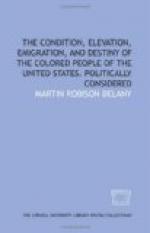It is useless to talk about our rights in individual States: we can have no rights here as citizens, not recognised in our common country; as the citizens of one State, are entitled to all the rights and privileges of an American citizen in all the States—the nullity of the one necessarily implying the nullity of the other. These provisions then do not include the colored people of the United States; since there is no power left in them, whereby they may protect us as their own citizens. Our descent, by the laws of the country, stamps us with inferiority—upon us has this law worked corruption of blood. We are in the hands of the General Government, and no State can rescue us. The Army and Navy stand at the service of our enslavers, the whole force of which, may at any moment—even in the dead of night, as has been done—when sunk in the depth of slumber, called out for the purpose of forcing our mothers, sisters, wives, and children, or ourselves, into hopeless servitude, there to weary out a miserable life, a relief from which, death would be hailed with joy. Heaven and earth—God and Humanity!—are not these sufficient to arouse the most worthless among mankind, of whatever descent, to a sense of their true position? These laws apply to us—shall we not be aroused?
What then shall we do?—what is the remedy—is the important question to be answered?
This important inquiry we shall answer, and find a remedy in when treating of the emigration of the colored people.
XVII
EMIGRATION OF THE COLORED PEOPLE OF THE UNITED STATES
That there have been people in all ages under certain circumstances, that may be benefited by emigration, will be admitted; and that there are circumstances under which emigration is absolutely necessary to their political elevation, cannot be disputed.
This we see in the Exodus of the Jews from Egypt to the land of Judea; in the expedition of Dido and her followers from Tyro to Mauritania; and not to dwell upon hundreds of modern European examples—also in the ever memorable emigration of the Puritans, in 1620, from Great Britain, the land of their birth, to the wilderness of the New World, at which may be fixed the beginning of emigration to this continent as a permanent residence.
This may be acknowledged; but to advocate the emigration of the colored people of the United States from their native homes, is a new feature in our history, and at first view, may be considered objectionable, as pernicious to our interests. This objection is at once removed, when reflecting on our condition as incontrovertibly shown in a foregoing part of this work. And we shall proceed at once to give the advantages to be derived from emigration, to us as a people, in preference to any other policy that we may adopt. This granted, the question will then be, Where shall we go? This we conceive to be all important—of paramount consideration, and shall endeavor to show the most advantageous locality; and premise the recommendation, with the strictest advice against any countenance whatever, to the emigration scheme of the so called Republic of Liberia.




